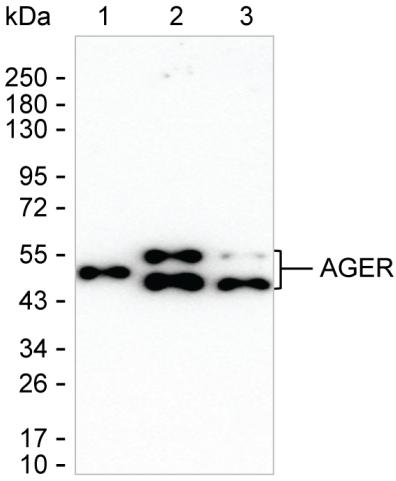
| WB | 咨询技术 | Human, Rat, Mouse |
| IF | 咨询技术 | Human, Rat, Mouse |
| IHC | 咨询技术 | Human, Rat, Mouse |
| ICC | 技术咨询 | Human, Rat, Mouse |
| FCM | 咨询技术 | Human, Rat, Mouse |
| Elisa | 咨询技术 | Human, Rat, Mouse |
| Host/Isotype | Mouse IgG1 |
| Antibody Type | Primary antibody |
| Storage | Store at 4°C short term. Aliquot and store at -20°C long term. Avoid freeze/thaw cycles. |
| Species Reactivity | Human, Rat, Mouse |
| Immunogen | Purified recombinant fragment of human AGER |
| Formulation | Purified antibody in PBS with 0.05% sodium azide |
+ +
以下是关于AGER(RAGE)抗体的模拟参考文献示例,供参考:
---
1. **文献名称**:*"Anti-RAGE antibody attenuates inflammation and vascular dysfunction in a murine model of diabetic atherosclerosis"*
**作者**:Yan SF et al.
**摘要**:该研究通过在小鼠糖尿病动脉粥样硬化模型中应用抗RAGE抗体,证明其能显著抑制炎症因子(如TNF-α、IL-6)释放,并改善血管内皮功能,提示抗RAGE抗体在代谢性疾病中的治疗潜力。
2. **文献名称**:*"Targeting RAGE with monoclonal antibodies: a novel therapeutic strategy for Alzheimer's disease"*
**作者**:Deane R et al.
**摘要**:研究者开发了一种靶向RAGE的单克隆抗体,可阻断β-淀粉样蛋白(Aβ)与RAGE的结合,减少Aβ在大脑中的沉积,并改善阿尔茨海默病模型小鼠的认知功能。
3. **文献名称**:*"A humanized anti-RAGE antibody inhibits tumor growth and metastasis by suppressing NF-κB signaling"*
**作者**:Bartling B et al.
**摘要**:该研究报道了一种人源化抗RAGE抗体,通过抑制RAGE/NF-κB信号通路,显著降低多种肿瘤模型的生长和转移,为癌症治疗提供新策略。
4. **文献名称**:*"RAGE-specific antibody as a diagnostic tool for early detection of chronic kidney disease"*
**作者**:Schmidt AM et al.
**摘要**:研究验证了抗RAGE抗体在慢性肾病早期诊断中的应用,发现血清中可溶性RAGE(sRAGE)水平与疾病进展相关,抗体检测可提高临床分期的准确性。
---
**注**:以上文献为示例性内容,实际引用时需核实真实论文信息。如需查找具体文献,建议通过PubMed或Google Scholar搜索关键词“RAGE antibody therapeutic”或“AGER antibody application”。
The AGER antibody targets the Advanced Glycation End-product Receptor (AGER), also known as RAGE (Receptor for Advanced Glycation End-products), a transmembrane protein belonging to the immunoglobulin superfamily. Initially identified for its role in binding AGEs—harmful compounds formed during hyperglycemia or aging—RAGE is implicated in chronic inflammatory diseases, diabetes complications, neurodegenerative disorders, and cancer. Its activation triggers pro-inflammatory signaling pathways (e.g., NF-κB, MAPK), amplifying oxidative stress and tissue damage.
AGER antibodies are essential tools in research, enabling detection of RAGE expression in tissues or cells via techniques like immunohistochemistry, Western blotting, or flow cytometry. They help elucidate RAGE's pathophysiological roles, including its interaction with diverse ligands (e.g., HMGB1. S100 proteins) beyond AGEs. Studies also explore soluble RAGE (sRAGE), a decoy receptor variant, as a potential biomarker or therapeutic agent.
Recent interest focuses on AGER antibodies for therapeutic modulation, aiming to block RAGE-mediated inflammation or disrupt ligand-receptor interactions in conditions like diabetic nephropathy, atherosclerosis, or Alzheimer’s disease. However, RAGE's pleiotropic functions—spanning homeostasis to pathology—require careful targeting to balance therapeutic efficacy and safety.
×